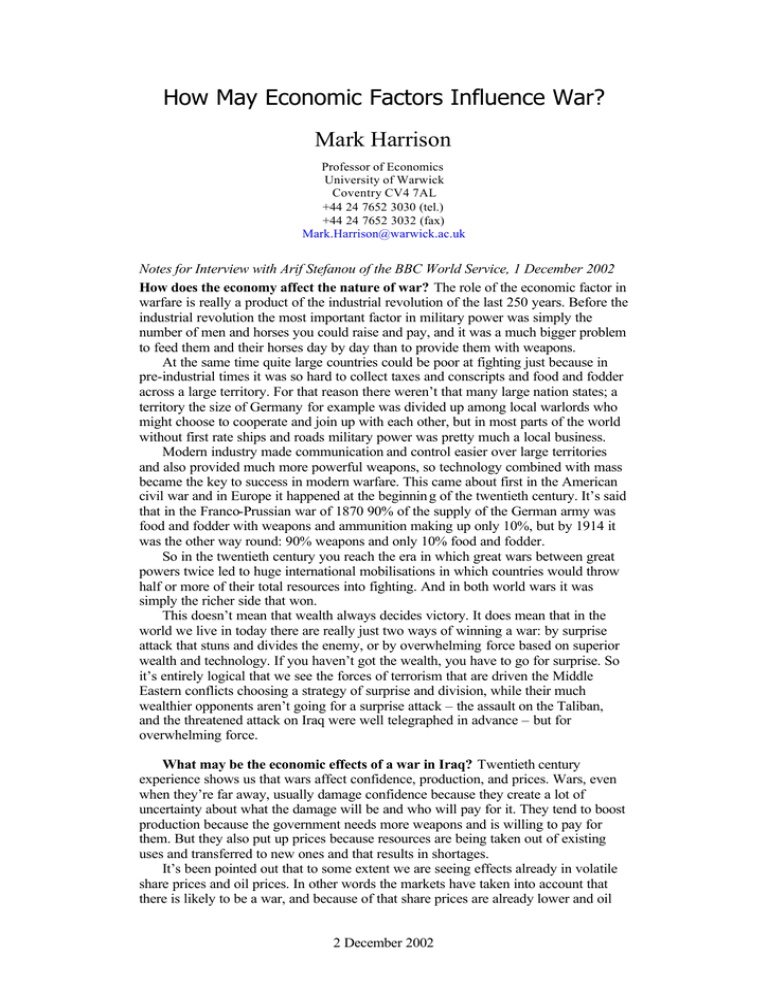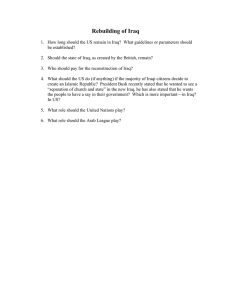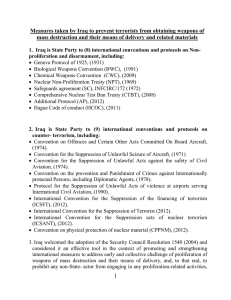How May Economic Factors Influence War? Mark Harrison
advertisement

How May Economic Factors Influence War? Mark Harrison Professor of Economics University of Warwick Coventry CV4 7AL +44 24 7652 3030 (tel.) +44 24 7652 3032 (fax) Mark.Harrison@warwick.ac.uk Notes for Interview with Arif Stefanou of the BBC World Service, 1 December 2002 How does the economy affect the nature of war? The role of the economic factor in warfare is really a product of the industrial revolution of the last 250 years. Before the industrial revolution the most important factor in military power was simply the number of men and horses you could raise and pay, and it was a much bigger problem to feed them and their horses day by day than to provide them with weapons. At the same time quite large countries could be poor at fighting just because in pre-industrial times it was so hard to collect taxes and conscripts and food and fodder across a large territory. For that reason there weren’t that many large nation states; a territory the size of Germany for example was divided up among local warlords who might choose to cooperate and join up with each other, but in most parts of the world without first rate ships and roads military power was pretty much a local business. Modern industry made communication and control easier over large territories and also provided much more powerful weapons, so technology combined with mass became the key to success in modern warfare. This came about first in the American civil war and in Europe it happened at the beginnin g of the twentieth century. It’s said that in the Franco-Prussian war of 1870 90% of the supply of the German army was food and fodder with weapons and ammunition making up only 10%, but by 1914 it was the other way round: 90% weapons and only 10% food and fodder. So in the twentieth century you reach the era in which great wars between great powers twice led to huge international mobilisations in which countries would throw half or more of their total resources into fighting. And in both world wars it was simply the richer side that won. This doesn’t mean that wealth always decides victory. It does mean that in the world we live in today there are really just two ways of winning a war: by surprise attack that stuns and divides the enemy, or by overwhelming force based on superior wealth and technology. If you haven’t got the wealth, you have to go for surprise. So it’s entirely logical that we see the forces of terrorism that are driven the Middle Eastern conflicts choosing a strategy of surprise and division, while their much wealthier opponents aren’t going for a surprise attack – the assault on the Taliban, and the threatened attack on Iraq were well telegraphed in advance – but for overwhelming force. What may be the economic effects of a war in Iraq? Twentieth century experience shows us that wars affect confidence, production, and prices. Wars, even when they’re far away, usually damage confidence because they create a lot of uncertainty about what the damage will be and who will pay for it. They tend to boost production because the government needs more weapons and is willing to pay for them. But they also put up prices because resources are being taken out of existing uses and transferred to new ones and that results in shortages. It’s been pointed out that to some extent we are seeing effects already in volatile share prices and oil prices. In other words the markets have taken into account that there is likely to be a war, and because of that share prices are already lower and oil 2 December 2002 2 prices are higher. And these are doing some damage. Generally you can expect western economies to become more depressed, partly because businesses will be less willing to invest in an uncertain future, partly because their production costs are going to rise with higher energy prices, and that always makes unemployment rise. Part of the problem is that western market economies are already not in such good shape. There are very high levels of private indebtedness that are being made worse by interest rates that may seem low by historical standards but inflation is low too so the real burden of interest payments is in fact relatively high. Of course there could be a benefit from war in the boost to military production, but really it seems unlikely that that’s going to significantly outweigh the downside. This is because the Americans will win any war with Iraq quite quickly by the use of overwhelming force. I don’t mean their problems will stop there. All sorts of awful consequences may possibly ensue, up to and including the destabilisation of the entire Middle East. But the point is that these problems will be problems of political instability and terrorism, not of conventional warfare. So any boost to war production will not be long lived. Therefore I think the markets are right to take on balance a negative view of the future. How important are economic interests in decisions to go to war? In a general sense I think they are always at one remove. Going to war is a political act and I think you have to start with the motives of the politicians. And generally speaking I think politicians go to war when they see it as the best way of staying in power. I don’t necessarily mean that cynically: defending your country may well be perfectly justifiable way of getting re-elected. But let’s not forget what Clausewitz said: war is just the continuation of politics by other means. There are clear political interests at stake on both sides in the war on terrorism as well over Iraq. It’s not just question of President Bush’s reelection but also of who holds power in the community across the region of the Middle East, in Israel and Palestine, in Egypt, Yemen, Saudi Arabia, and so on, and in the Horn of Africa too. In most wars there are clearly huge economic interests at stake as well. In World War I Britain and France had old colonial empires and Germany wanted a new one. In World War II Britain still had a colonial empire, Germany still wanted a new one, and America wanted to rid the world of empires and have free trade. In the case of Iraq the control of Middle Eastern oil is at stake. You can be certain that western oil companies are considering the outcomes of a possible war very carefully. Some people have suggested that the whole thing may be just a conspiracy between President Bush and Big Oil to get their hands on Iraqi reserves. I think that will almost certainly turn out to be an exaggeration. The James Bond image of tycoons plotting to destabilise the world to make money is mainly a Hollywood cliché. On the whole businesses are too busy competing with each other to think about that sort of thing and coordinate a policy. That’s why they fund political parties, to do that sort of thinking and coordination for them. What we know about the way companies behave tells us that first and foremost they are opportunists. That means that business will always follow the flag. If Iraq falls under American domination the American oil companies will be right in there, and they will probably succeed in displacing the Russian and French interests that are dealing with Saddam Hussein. Similarly we know that in World War II German companies followed the Nazi armies through occupied Europe and grabbed what they could in France, eastern Europe, and Russia. But it doesn’t mean that Hitler’s war was directed by big business. A lot of German industrialists were pretty edgy about Hitler because they feared that his armament policies would just give a short term boost, then leave them with too much loss making war capacity. After the war the Americans tried as hard as they could to convict leading German industrialists of plotting with Hitler to go to war, and they couldn’t prove it.



